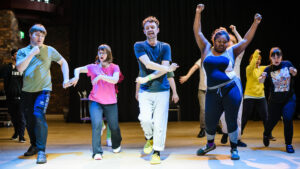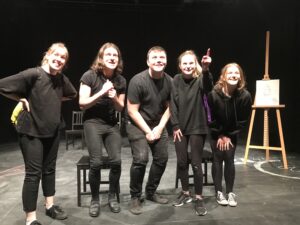From September 2021, Mind the Gap’s Performance Academy programme for learning disabled and autistic adults has been validated as a Certificate in Higher Education by York St John University. This is the first validation of its kind in the UK. To further develop the pedagogical relationship between the two institutions, Claire Hind from York St John University and Mike Beigel from Mind the Gap visited each other in autumn 2021 to establish a learning and teaching exchange across the two institutions. In this blog they reflect upon their experiences.
Claire. After battling with the wind and rain on a cold November morning, I was given a warm welcome from Mike Beigel and his students who are studying the Performance Academy course at Mind the Gap, Bradford.
Approached by 5 enthusiastic and inquisitive students I was asked really interesting questions about the drama, theatre and dance courses at YSJU about our spaces, our students and how Mind the Gap students could engage with us in the future. There was a genuine interest in what I teach and I was happy to share with the students examples of how we work at York St John University.

Mike and I had discussed a very simple exchange to begin with – a chance to meet the students from both institutions and observe their learning experiences. I was invited to sit and watch a 75-minute workshop on acting skills – directly relating to interpreting and understanding text as performance. To begin with Paul, who once trained at Mind the Gap, now a permeant artist at the company and on a work placement with the theatre strand, delivered the warm up. The game he played allowed the students to find the energy and focus between partners across a circle, which enabled the students to learn about clear communication through direct eye contact showing a purposeful intention. It was wonderful to see a graduate of Mind the Gap lead the next generation of students who were embodying the rules of the game, committing playfully yet mindfully to their practice.
Mike ran a workshop on text interpretation – working with the idea that the actor should follow the thought of a character’s line. His instructions to understand the thought process behind every single word a character says – and hold importance, was an exciting experience for the students because it meant they could be responsible and be empowered by the interpretation exercise. By asking the students what the thought process was behind each line – offered the students the creative freedom to make choices on behalf of that character and bring them to life through the performance of the line, which was made even more colourful and meaningful because of the thought.
Students were split into groups to share their examples and performed to their colleagues (who formed a critical audience). Here, all students were asked to comment on what was effective about each individual performance and the tutor, who has trained as a director, gave them creative food for thought by supporting the decisions each individual had made about their own character, and following up with some further suggestions; feed forward.
Afterward Mike and I talked about the way in which all students were permitted to respond and feed into the creative process.
Mike. I arrived to York on a crisp, sunny, winter’s morning. The walk to YSJU was a treat, and I even stumbled across some of last year’s cohort, capped and gowned, and who happened to be graduating that very day at York Minister Cathedral. Although a coincidence based on the day I visited and the route I took, it provided a welcome reminder of the importance, rigour and respect that is being extended to Mind the Gap through this validation.

The day continued in a refreshing vein on arrival at YSJU, seeing the brilliant new Creative Centre and picturesque setting, no doubt providing inspiration for students and staff alike. In Claire’s Acting Vignette’s session from the BA Hons. Acting Degree, I was treated to a sneak peak of the students’ first complete sharing of their works so far. On this module students follow an actor training program called The View Points to enable a series of vignettes (small plays, scenes, shorts) to come to life. The View Points consider 9 training experiences, 3 of which are Tempo (the speed of a movement), kinaesthetic response (how others physically and intuitively respond to others in the moment of an action) and repetition; how cycles of the same or similar material can prove useful to the shaping of narrative. Working in small groups the students performed a collage of shorts scenes: snippets of texts, songs and moments of interest, with varying tempo, themes and style. The processes were clear and the performances were engaging and entertaining, keeping me excited with new ideas and rapid changes of tone and style. The students added layers of meaning and interest through repetition and occasionally heightened performance style. The performances were accomplished and the students enjoyed contributing and receiving insightful feedback from other students and Claire in terms of how to develop their performances to provide even more variation and greater levels of detail and interest.
Claire and Mike. We are now discussing what the possibilities of the next stages of this exchange, after observing how the students learn across the institutions. We are working on a plan for Mike to lead a session to second year students at YSJU in semester two on script interpretation, and for Claire to plan a workshop on devising theatre using text and scores for Mind the Gap Students. We are excited about what this exchange can offer the students and what it might lead to in the future – we have witnessed how much of our teaching and learning crosses over, that we teach very similar, if not complimentary ideas.

